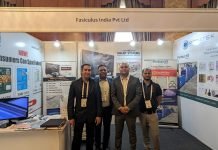
In partnership with SIG, a leading systems and solutions provider for aseptic carton packaging, Nestlé Brazil now brings its complete Nescau beverage range to the market in SIG’s combiblocMini carton packs, with SIG’s innovative, renewable and recyclable paper straw solution.
According to the press statement, this important change helps to meet the sustainability goals of Nestlé, which has the vision that none of its packaging ends up improperly discarded in the environment, especially in seas, oceans, or watercourses. Changing to SIG’s paper straw will prevent the use of up to 300 million plastic straws per year – a huge saving for the environment.
SIG said it was the first beverage industry to offer a market-ready paper straw solution for aseptic carton packs. After introducing the straight paper straw back in February 2019, SIG also launched a U-shaped paper straw for aseptic carton packs some months later.
SIG aims to become a net-positive company, and Nestlé believes in Creating Shared Value to have a long-term positive impact on all stakeholders connected to its business. Among its goals, Nestlé intends to reduce the amount of plastics in the brand’s products and make consumers aware of the importance of correct disposal of packaging. Nestlé is committed to finding the best solutions to reduce, reuse, and recycle, committing to ensure that 100% of its packaging will be reusable or recyclable, including the non-use of non-recyclable plastics, by 2025.
“SIG developed the entire project for Nestlé at the Feira de Santana plant – from the installation and adaptation of the filling technology, to applying the paper straw to the carton after filling. Our main objective was to use all our know-how and technology to find the best, and at the same time, most sustainable solution for Nestlé,” says Andressa Joaquim, SIG market director in South America.
For the Nescau brand, Nestlé will run three SIG filling lines to fill combiblocMini carton packs in five-volume sizes from 125ml to 250ml. This makes SIG the only carton packaging partner for Nescau.
SIG has been focusing heavily on the future technology and innovation of its equipment, with the ultimate goal of bringing sustainable solutions for its customers and ultimately the end consumers.
“Nestlé always strives to find innovative solutions that add technology and sustainability, promoting unique experiences for food consumption and helping to reveal the power to improve people’s quality of life,” says Cristiani Vieira, environmental sustainability manager at Nestlé.
Besides the flexibility of filling different products and volume sizes on the same filling machine, SIG packaging offers the highest food safety and quality. It is one of the most sustainable packaging solutions for long-life beverages and food. Independent lifecycle assessments show that SIG carton packs offer significantly better environmental performance than alternative packaging for a range of products, including long-life food, UHT milk, and non-carbonated soft drinks.
Nescau Prontinho packaging with the new SIG paper straw solution will be available from December 2020 at major retailers in Brazil.
SIG is a systems and solutions provider for aseptic carton packaging. The company collaborates with its customers to bring food and beverage products to consumers worldwide in a safe, sustainable, and affordable way. It’s a technology and outstanding innovation capacity that enables us to provide our customers with end-to-end solutions for differentiated products, smarter factories, and connected packs to address consumers’ ever-changing needs. Sustainability is integral to our business, and we are going Way Beyond Good to create a net positive food packaging system. Founded in 1853, SIG is headquartered in Neuhausen, Switzerland.
Nestlé is the largest food and beverage company in the world. It is present in 190 countries, and its 308,000 employees are committed to Nestlé’s purpose of improving the quality of life and contributing to a healthier future. Nestlé offers a wide portfolio of products and services for each life stage of people and their pets. Its more than 2000 brands range from global icons such as Nescafé or Nespresso to local favorites such as Nest.
The company’s performance is driven by its Nutrition, Health, and Wellness strategy. Its headquarters are in the Swiss city of Vevey, where it was founded over 150 years ago. In Brazil, it installed the first factory in 1921, in the city of Araras, São Paulo, to produce Milkmaid condensed milk, which would later be known as Leite Moça. The company has industrial units located in São Paulo, Minas Gerais, Bahia, Pernambuco, Goiás, Rio de Janeiro, Rio Grande do Sul, and Espírito Santo.










